IMAM RUHOLLAH KHOMEINI’S LEGACY LIVES ON IN ZIMBABWE
HARARE, 5 JUNE 2025 As Muslims, friends and admirers of Imam Khomeini worldwide marks the 36th anniversary of his demise and enduring legacy, Zimbabweans and Iranians resident in Zimbabwe, all united in their various religious persuasions, have called for a justice-driven world order as a way of honouring Imam Khomeini's legacy.
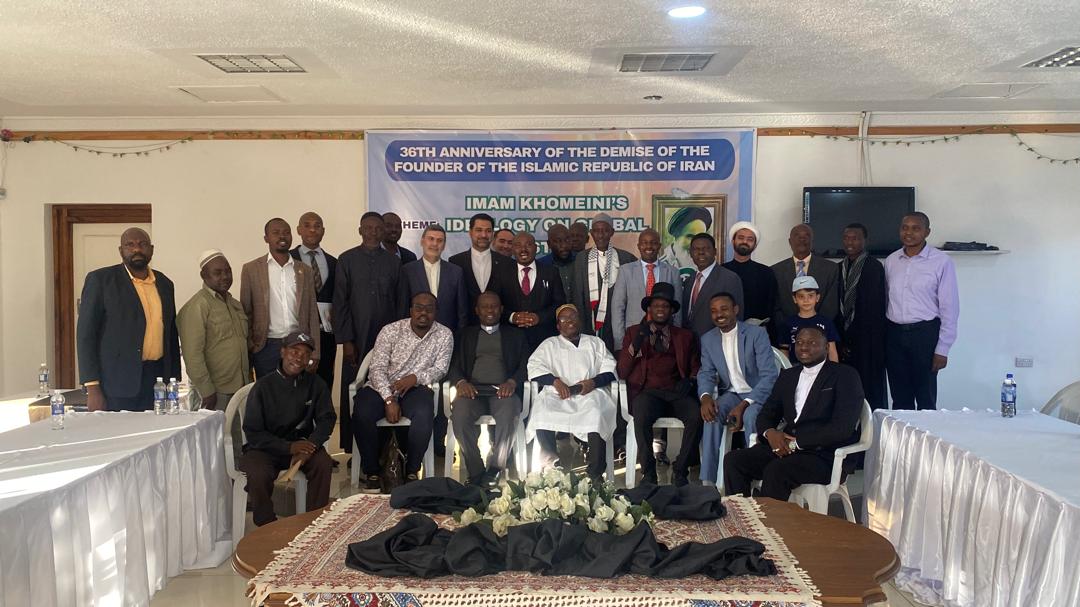
They spoke glowingly of the legendary elder statesman who fought gallantly for the emancipation and freedom of all the oppressed people of the world, a man who believed that justice was the only panacea that would help in bringing everlasting freedom and peace onto the world’s marginalised, oppressed and freedom seeking people.
They paid tribute to his legacy that continues to redefine the new world order, that of justice for humanity.
Such was the overwhelming admiration for Imam Khomeini, the late Founding Father of modern-day Iran and a staunch critic of the West’s double standards on the oppressed people of the world dotted in various global hotspots such as Palestine.
In voicing their concerns during a One-day conference held in Harare on 4 June, 2025, the participants were all unanimous in endorsing Imam Khomeini’s call for global justice as a means of ensuring the attainment of freedom and peace for all the world’s oppressed. The conference was convened and organised by the Cultural Centre of the Embassy of Iran in Zimbabwe and ran under the theme: Imam Khomeini’s Ideology on Global Justice.
Officially opening the conference, Professor Fainos Mangena, the Dean of the Faculty of Arts and Humanities at the University of Zimbabwe said Imam Khomeini fought and advocated for a world in which justice prevailed.
Prof. Mangena condemned western powers for downplaying the injustice perpetrated on other countries by some other nations. He said it was baffling that some western countries still do not believe in the concept that there should be justice for the oppressed. He condemned the domination and bullying from some of the Western countries on other nations.
Prof. Mangena said the successful execution of the Islamic Revolution was an awakening call for most of the oppressed people as it galvanised them to fight for their own freedom.
Mr Hamid Bakhtiyar, the Cultural Counsellor of the embassy of Iran in Zimbabwe, said Imam Khomeini was more than a political leader as he was also a voice for the voiceless, a voice for resistance against injustice and was also a fighter for the underprivileged.
Mr Bakhtiyr said Imam Khomeini fought global domination by some perceived powerful nations as he also called for global awakening, a rallying call that continues to embolden all freedom seeking world citizens still seeking their freedom from their oppressors. He said Imam Khomeini fought global injustice and hegemony and called for a world order based on justice.
He said Imam Khomeini always condemned some Western countries that supported the Israeli aggression and continued occupation of Palestine.
Mr Nasseri Assiabi, Second Secretary at the Embassy of Iran, said in line with Imam Khomeini’s teachings, Iran continues to support the world’s oppressed. He said from Iran’s perspective, global justice is paramount as the world today is heavily exploited by some powerful nations.
He said in keeping Imam Khomeini’s legacy alive, Iran continues to grow on all fronts, much to the disbelief of Iran’s detractors.
Mr Assiabi said Iran, under Imam Khomeini, was also supportive of Zimbabwe’s liberation struggle.
Bishop Albert Chikuni, President of the Interreligious Association for Peace and Development Zimbabwe (IAPDZ) encouraged global faith-based organisation to engage in meaningful dialogue for the sustenance of an enduring justice system that can also overcome divisions among nations and communities. Bishop Chikuni noted that global faith organisations should also be agents for social and economic justice and should bestow onto humanity a peaceful and just world.
Dr Azizi a lecturer in the Department of Philosophy, Religion, and Ethics at the University of Zimbabwe said the creation of an Islamic Republic by Imam Khomeini was to simply demonstrate to the world that a religious based nation could be sustained. He said his creation of the Islamic Republic of Iran emboldened modernity and brought about broad social changes that have made Iran a great and much recognised nation.
Mr Francis Zangairai, an examinations officer, lecturer and AJU VEREAD director at Arrupe Jesuit University said Imam Khomeini bestowed on humanity a justice legacy which should be embraced by everyone. He further challenged all admirers and followers of Imam Khomeini to be the ambassadors of that legacy.
Reverend Father Mgcine Moyo, Deputy Secretary General, Zimbabwe Catholic Bishops Conference said that dignity thrives in humanity when there is justice. He said communities built on sound justice systems are immune from domination and other forms of revolts. Father Moyo said as epitomised by Grand Ayatollah Khomeini, people should continue to work for peace, peaceful coexistence and love.
Reverend Innocent Chitanda, the Secretary General of the Zimbabwe Heads of Christian Denominations and also the Head of the Union for the Development of Apostolic Churches in Zimbabwe and Africa (UDACIZA) said he was baffled by the continued silence of most of the world’s religious leaders on the Palestinian crisis. He said as proponents of peace and peaceful coexistence among nations and communities, history will judge religious leaders harshly as they are supposed to act and speak out against the heinous and continuous killing of the innocent Palestinians by Israel.
Mr Prince Sibanda, the secretary for education in ZINATHA, (Zimbabwe Traditional Healers Association), which falls under the African Traditional Religion (ATR), said his religion has continued to thrive since the coming into being of the black human race in Zimbabwe due to its dependence on the observance and implementation of the traditional justice system that was also being advocated for by Imam Khomeini.
Rev Father Mutelo, a lecturer at Arrupe Jesuit university said Imam Khomeini proposed a governance model where justice and spirituality are linked, rooted in ethical values and spiritual consciousness. For him, political governance should actualise justice and spirituality in society, ensuring growth, unity, and dignity for the oppressed.
He noted that Imam Khomeini’s perception of justice and spirituality provides a bold vision to transform egoistic governance.
Mr Tauya Chinama, a philosopher and activist, said Zimbabwe needs to draw some lessons from Ima Khomeini’s struggles as it (Zimbabwe) fights to reclaim its stolen heritage from the former colonial power, Britain. He said Zimbabwe needs to get its historical artefacts from Britain which were stolen from the country during the occupation war by the British. Such artefacts include decapitated heads of traditional chiefs who were killed whilst resisting British occupation.
Sheikh Ismail Duwa acknowledged the tireless efforts being done by Interfaith leaders in uniting and educating their communities on various concepts of justice and peace guided by their holy religious scriptures.
The conference was attended by academics from the university of Zimbabwe and Arrupe Jesuit university, The Zimbabwe Catholic Bishops Conference, leaders from Zimbabwe’s various religious organisations, diplomats from the embassy of Iran as well as members of the Iranian community resident in Zimbabwe.

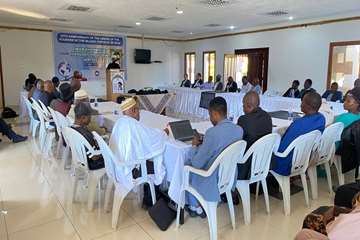
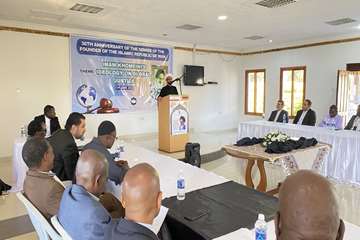
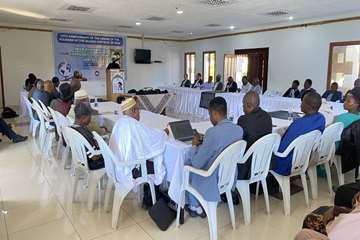
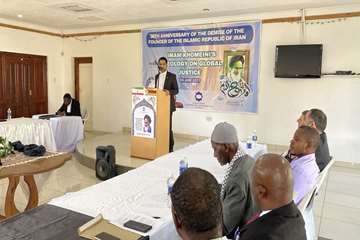
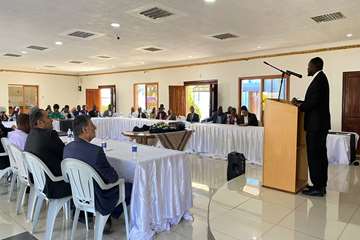
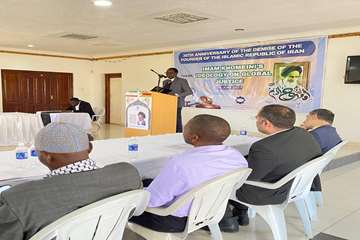
Write your comment.